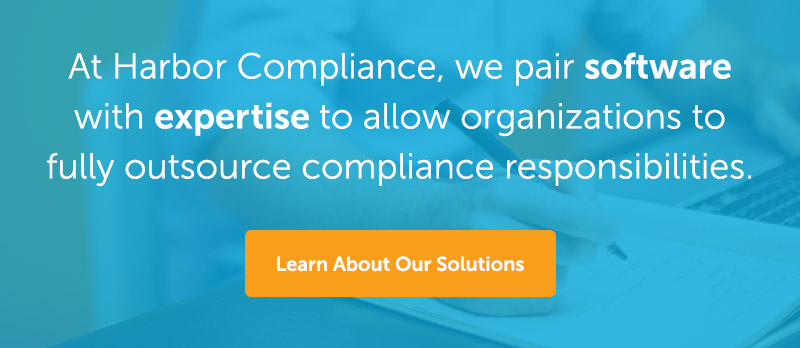-
Software
Compliance Software
Oversee licenses, track renewals, access documents, and more from a single interface.
Software Overview -
Services
Compliance Services
Full service compliance solutions for organizations throughout their entire lifecycles.
Services Overview -
Industries
-
Partner
- Information Center
What Does it Take to Register for Charitable Solicitation?
In our last article, we discussed where your charity is required to register to solicit donations. Generally speaking, registration is mandatory in any state in which you are soliciting donations.
You may find that your organization has to register in one state or all 41 states that currently have registration requirements. Registering in any number of states is certainly a major undertaking. This article will outline the various complexities inherent in the process along with the steps that you should follow to properly proceed with registration. We have found that these steps produce the best possible outcomes in getting an organization registered quickly and without rejected filings.

1. Research
The first step should be careful and complete research. It’s imperative that you start with identifying the current status of your organization’s registration and the exact requirements specific to your organization. It is better to get these answers before submitting applications to the states as opposed to finding out by way of rejected filings. There are several items to understand.
Registration status
It is critical to know whether your organization has ever registered with a given state before proceeding with filing. The current status of your organization’s registrations has many implications for how you will proceed. Miscommunication resulting from staffing transitions and incomplete recordkeeping often results in lost information. There are a few potential scenarios:
If not registered: identify the initial application, filing fee, and supplementary requirements.
If already registered and in good standing: identify the renewal due date and make sure that adequate systems are in place to avoid late filing fees and associated penalties.
If already registered but not in good standing: identify the back-due filings and late fees owed to bring the registration current.
Applications, fees, and supplements
Your organization’s registration status is just one element that informs how to proceed with registration. There are myriad factors that determine the specific registration requirements. The main factors include the type of organization, total revenue, contributions, and methods of solicitation. The requirements can vary widely depending on these specifics. Researching the following information is necessary prior to registering with each state.
Application form – initial registration, renewal registration, exemption application, Unified Registration Statement (URS), etc.
Application fee – generally on a sliding scale and is determined by the previous year’s contributions or gross receipts.
Supporting documents – typically include articles of incorporation, IRS determination letter, and recent 990 return.
Financial statements – may need to be compiled, reviewed, or audited.
How to file – generally online, by mail, or fax.
Other pre-requisites
Some states require organizations to complete a separate filing with the secretary of state to register as an out-of-state (or “foreign”) nonprofit corporation. This process is called “foreign qualification” and requires appointing a registered agent that is responsible for receiving legal documents for the nonprofit. Other states require appointment of a registered agent without foreign qualification. Make sure to get these in place for the states that require them.
2. Prepare and file applications
Once you have completed the necessary research, you can begin working on the applications. Each state form is different. Properly completing the applications requires line-by-line scrutiny to ensure accuracy and completeness. Failure to adequately prepare an application and include the required supporting documents can lead to rejections and delays. The application form will need to accompany the required attachments and payment for the correct state fee.
A few items to note:
- About 25 of the 41 states accept paper applications.
- Some states allow you to file online, by fax, or by email to save paper. Regardless, you can expect to spend considerable time preparing, compiling, and submitting applications.
- Paper application packets can be a hundred pages or more for large organizations with complex 990s and financial statements.
- If your charity is delinquent, expect to submit multiple years at once.
- In some states, the only option is to use an online filing system.
- Using an online system can take hours to key in the information. Be sure to record usernames and passwords and factor in time for unreliable technology.
- Budget for the hard costs of paper, ink, and postage.
3. Monitor approvals
Once you submit an application, the process is not complete. You must monitor the filing and complete any necessary follow up to ensure the application gets approved.
Processing Times
State processing times vary greatly from as little as 1-2 days up to 6-8 months. In that time, the state may approve the filing, return questions, or reject the application due to major deficiencies. Due to these protracted processing periods in some states, it is much better to register proactively than at the last minute.
Types of State Correspondence
State correspondence typically falls into one of three categories: approvals, requests for additional information, and rejections. It is a good idea to save a copy of any and all correspondence in your records.
Approvals and confirmation
The best type of correspondence is, of course, approval! Depending on the state, this will arrive by email or mail. Your approval will contain a document with your registration number, registration date, renewal (expiration) date, and more information about that state’s reporting requirements.
Note: You may be able to find your approval and confirmation in the state’s online database. Most states are updated a few days before you receive “official” confirmation.
Requests for more information
Occasionally, a state examiner will postpone approval until you answer follow up questions or clarify a point on the initial application. These requests can be difficult to predict, but it is important to respond promptly with exactly what the state is asking for.
Note: Applicants whose 501(c)(3) status is pending with the IRS may not receive a full license until they submit a copy of their IRS determination letter to the state.
Rejections
An application may be rejected for any number of reasons. Typically, applications are rejected because they are either incomplete or certain information is not consistent or accurate. Rejections can add weeks or more to the process and create additional work so it is best to get the applications right the first time.
Next Steps
Completing charitable solicitation registration properly requires a rigorous, multiple step approach. Following the steps listed in this article generally produces the best possible outcomes in getting an organization registered in an expedient manner while avoiding many potential pitfalls. These steps can be a major undertaking for organizations, but engaging with a professional service company to manage these steps is the ideal solution for many charities.
Our approach is to pair software with expertise to allow organizations to fully outsource the responsibilities. Regardless of what stage an organization is in, we follow the best practices outlined in this article to help ensure organizations are compliant while minimizing their time and financial investment. Learn about how you can put your compliance on autopilot with our compliance solutions.






